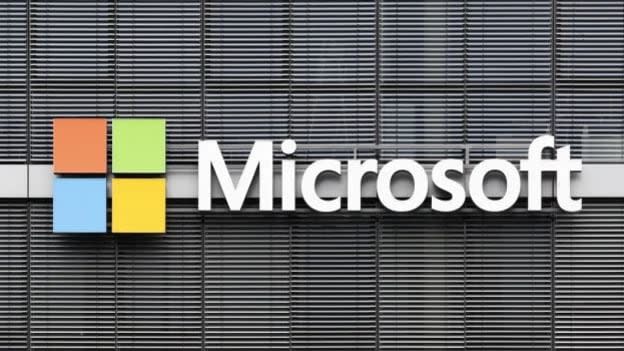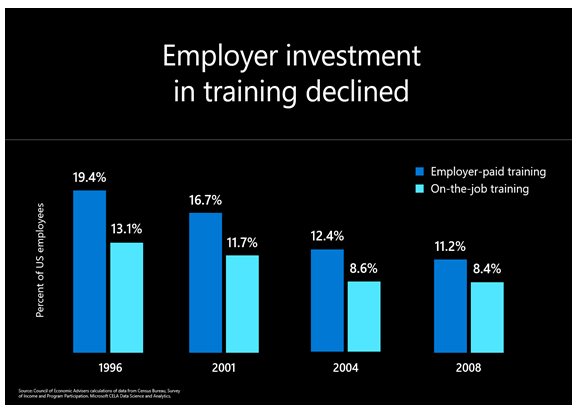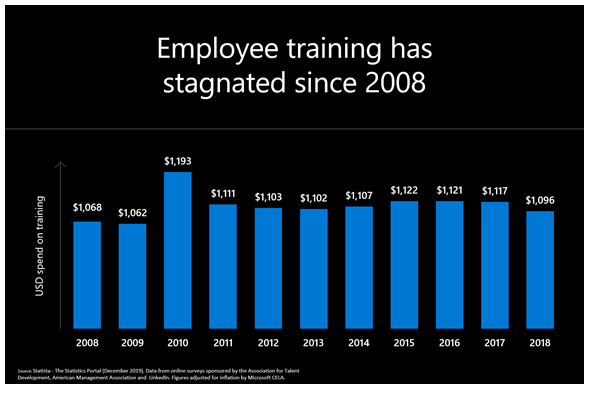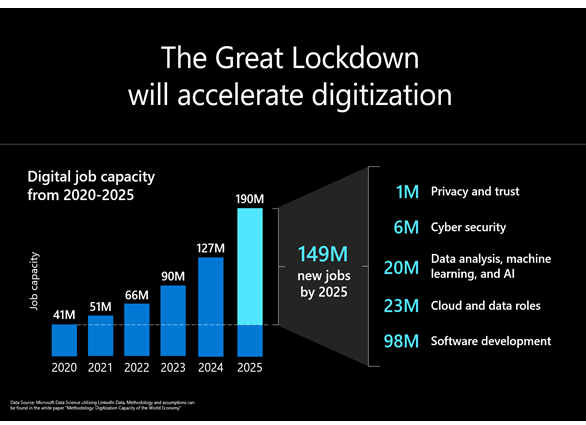Microsoft makes major commitment to skills training for 25Mn people across the globe

In a landmark announcement yesterday, Microsoft outlined their new global learning initiative, an extensive, worldwide campaign that will pool resources from LinkedIn, GitHub, and Microsoft softwares and leverage data and tech to create a truly comprehensive, learning-led movement. Aiming to reach 25 million people globally by the end of 2020, the initiative stands to have an unprecedented impact on the labour market and economy at large. With data-driven insights, specific skills training and industry-renowned qualifications offered free or at reduced rates, the learning system will provide tangible enhancements to job-seekers' portfolios and connect them with relevant job openings, enabling people to get back to work as rapidly and as well-equipped as possible.
In their press release, the company outlined their vision for the system as follows:
“(1) The use of data to identify in-demand jobs and the skills needed to fill them;
(2) Free access to learning paths and content to help people develop the skills these positions require;
(3) Low-cost certifications and free job-seeking tools to help people who develop these skills pursue new jobs.”
Success skills after The Great Lockdown
In an interview on Sunday, billionaire sports entrepreneur Mark Cuban said that the one question leaders are going to be asking after the crisis is “what skills did you add during the pandemic of 2020?” There’s little doubt that in an increasingly uncertain and disrupted labour market, it's skills that are going to get job-seekers noticed and keep them competitive even as certain jobs themselves start to disappear.
According to Microsoft, pre-COVID employer investment in learning and development had reportedly begun to stagnate over the years, hovering at around 11.2% of corporate budgets since 2008.


However, over the last few months, spending on online learning has spiked alongside the number of hours professionals are putting into their professional development. According to a recent LinkedIn Learning report, L&D professionals reported a 159% increase in CEOs championing learning and development at their companies under COVID, while 66% of L&D professionals said they expect to spend more on virtual-instructor led training (VILT) than they did last year.
Microsoft’s announcement is one of the biggest endorsements yet of this way of thinking about professionals - not in terms of fixed titles, but in their unique skill sets that can be honed and developed to add value to a whole variety of different organizations.
Even before the outbreak, the emerging skills gap was a topic of debate and concern across industries. As Microsoft outlined, “the pandemic has shined a harsh light on what was already a widening skills gap around the world – a gap that will need to be closed with even greater urgency to accelerate economic recovery.” Automation, increased digitisation and the Fourth Industrial Revolution were driving rapid change before COVID, and will continue to drive rapid change post-COVID - albeit in a drastically altered landscape.
Spurred by what’s become known as ‘The Great Lockdown,’ Microsoft predicts that by 2025 there will be around 149m new jobs added to the workforce that are related to digitisation. In the graphic below, Microsoft highlights the distribution of jobs in fields that will experience mammoth growth in the lockdown: privacy & trust, cybersecurity, data analysis, cloud roles and software development.

All of these jobs will require specific skills, and while Microsoft recognise the necessity of technical training for working in such sectors, they also reiterate how in-demand soft skills (what they call ‘success skills’) will be.
“People-oriented “success skills” remain as essential as ever – perhaps even more so given their durability at a time when technology continues to evolve at breakneck speed,” they write.
Agility is key and, in recognition of this fact, Microsoft compiled a list of jobs and horizontal skills, then created ten Learning Paths using this information. These top ten jobs identified by Microsoft were seen to have “the greatest number of job openings, have had steady growth over the past four years, pay a livable wage, and require skills that can be learned online.”
All ten of these Learning Paths are available to access for free online until March 2021:
- Become a Software Developer
- Become a Sales Representative
- Become a Project Manager
- Become an IT administrator (Prepare for CompTIA Network+ Certification)
- Become a Customer Service Specialist
- Become a Digital Marketing Specialist
- Become IT Support / Help Desk (Prepare for the CompTIA A+ Certification)
- Become a Data Analyst
- Become a Financial Analyst
- Become a Graphic Designer
Comprehensive, data-driven change
The amount of data Microsoft and LinkedIn have at their fingertips is staggering: LinkedIn’s CEO Ryan Roslansky revealed that from the 690Mn people and 50Mn companies that use their platform, they’re seeing inputs of 5m new data points a minute. “Our goal is to try to get the right data to the right people to create the right learning path for them to acquire the skills they need,” Rolanksy said.
This initiative doesn't only have it's sights set on just transforming the corporate sector: Microsoft are expanding their horizons, using their data to help policy-makers, governments and leaders make informed and impactful choices about how they structure their teams, what skills and roles to look for and how best to seek out the most agile talent. Their interactive Workforce Index tool provides real-time insights into hiring demands and highlights skills gaps to help leaders stay informed.
The pandemic is a truly all-encompassing crisis, one that has touched almost every part of the world. To have any hope of negotiating the upcoming months and years, transformational change, innovation and adaptation must take place at all levels. By allowing free access to this invaluable information, Microsoft is doing their part to ensure data reaches the people who have the power to make decisions that impact those affected worst by the outbreak.
Microsoft Teams Learning App
As part of their June 30th statement, Microsoft also announced their development of a Microsoft Teams learning app, an exciting venture that will take their conferencing tool to the next level. Like many virtual work conferencing platforms, Microsoft Teams has seen huge growth as a result of pandemic, with usage reportedly growing by 894% between February 17th and June 14th.
Designed to help employers reskill and upskill current and potential employees, Microsoft says the app “will bring together best in class content from LinkedIn Learning, Microsoft Learn, third-party training providers, and a company’s own learning content and make it all available in a place where employees can easily learn in the flow of their work.”
Another example of how the crisis has spurred innovation and adaptation in all areas, the development of the Teams learning app will add another dimension to Microsoft’s extensive learning experience.
Lifelong learning
When talking about training and development, the question of continuous learning is often raised: how can professionals sustain and constantly be reskilling throughout their career lifecycles? In an already rapidly-changing landscape, COVID-19 has accelerated the pace of change, amplifying the absolute necessity of continual learning. Microsoft knows this, writing in their press release that their “vision for skills extends beyond these immediate steps for job seekers. Employees will also need to skill and reskill through their careers, and we want to make it easier for employers to help. Our vision is a connected ‘system of learning’ that helps empower everyone to pursue lifelong learning.”
Another key part of their learning initiative is through the significant price reduction of their highly-priced Microsoft qualifications. Usually costing over $100, the company has dropped the price of these exam-certified courses to $15, which will provide “the integrity of certifications by enabling proctoring safely in an online setting that is accessible from anywhere.”
Available in several languages, these industry-recognized qualifications will offer a valuable resume-boost to job-seekers reentering a hyper-competitive market.
An ethical approach to learning and skilling
Lastly, Microsoft’s system of learning will directly and try to elevate and assist those who have been impacted worst by the pandemic. As Microsoft outlines, this includes “those with lower educational attainment, people with disabilities, people of color, women, younger workers, and individuals who have less formal education.”
In what they refer to as this principled approach, Microsoft will not only be making their programs and qualifications free or significantly reduced, but will be providing $20Mn in cash grants to nonprofits worldwide, one quarter ($5Mn) of which will go to “community-based nonprofit organizations that are led by and serve communities of color in the United States.”
The team at Microsoft have long been admired for their ability to stay ahead of the curve, responding to the most pertinent needs of the present moment. The outbreak has been no exception. The “system of learning” will boost the skills of millions, setting them on the path to employment and better career stability as the economy begins to reopen post-COVID. These latest learning initiative announcements will come at a welcome time for working professionals, as unemployment levels are projected to reach once-in-a-generation heights and many will be looking to learn invaluable skills as they seek out potential employment.
These resources are all available to access from here.
















